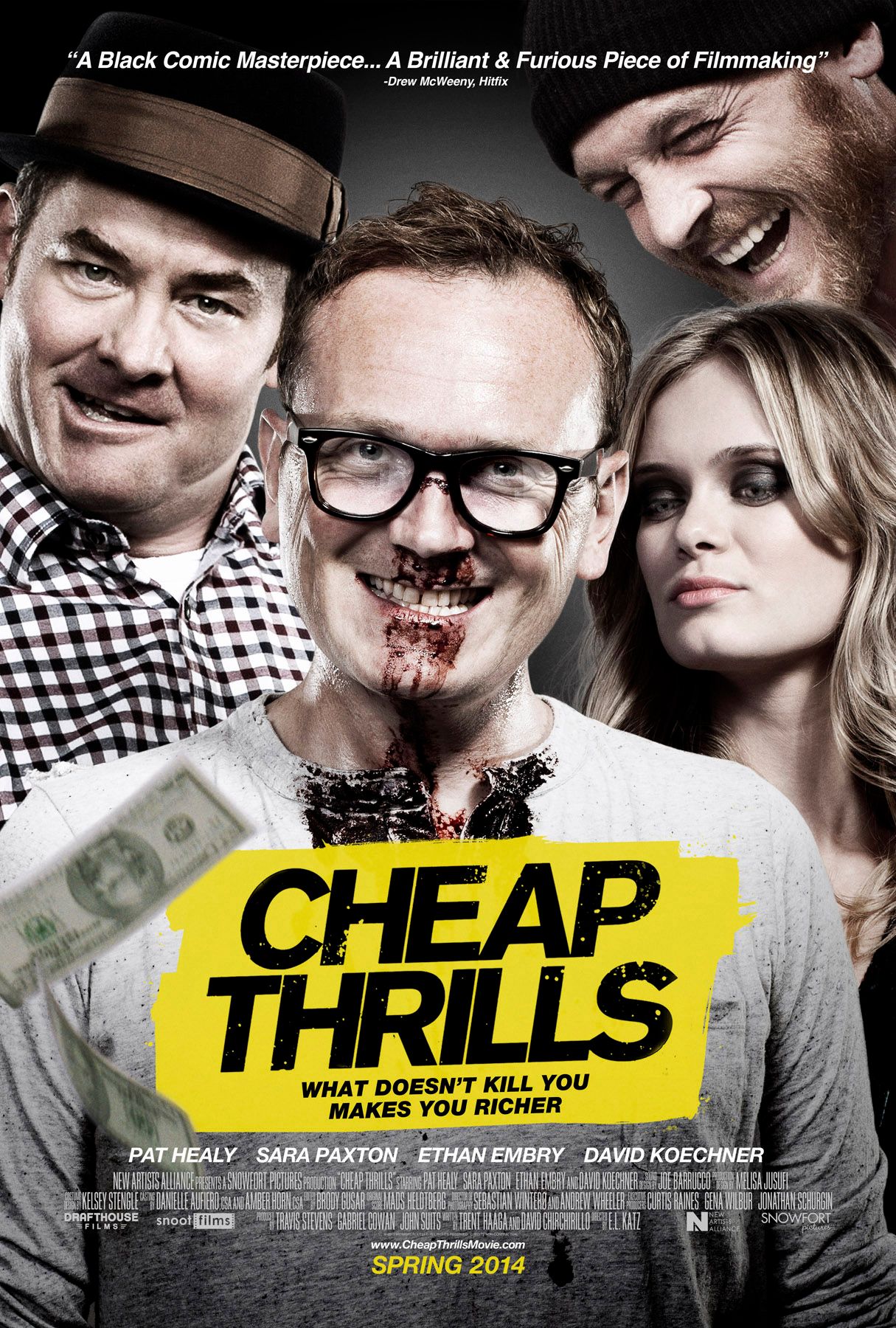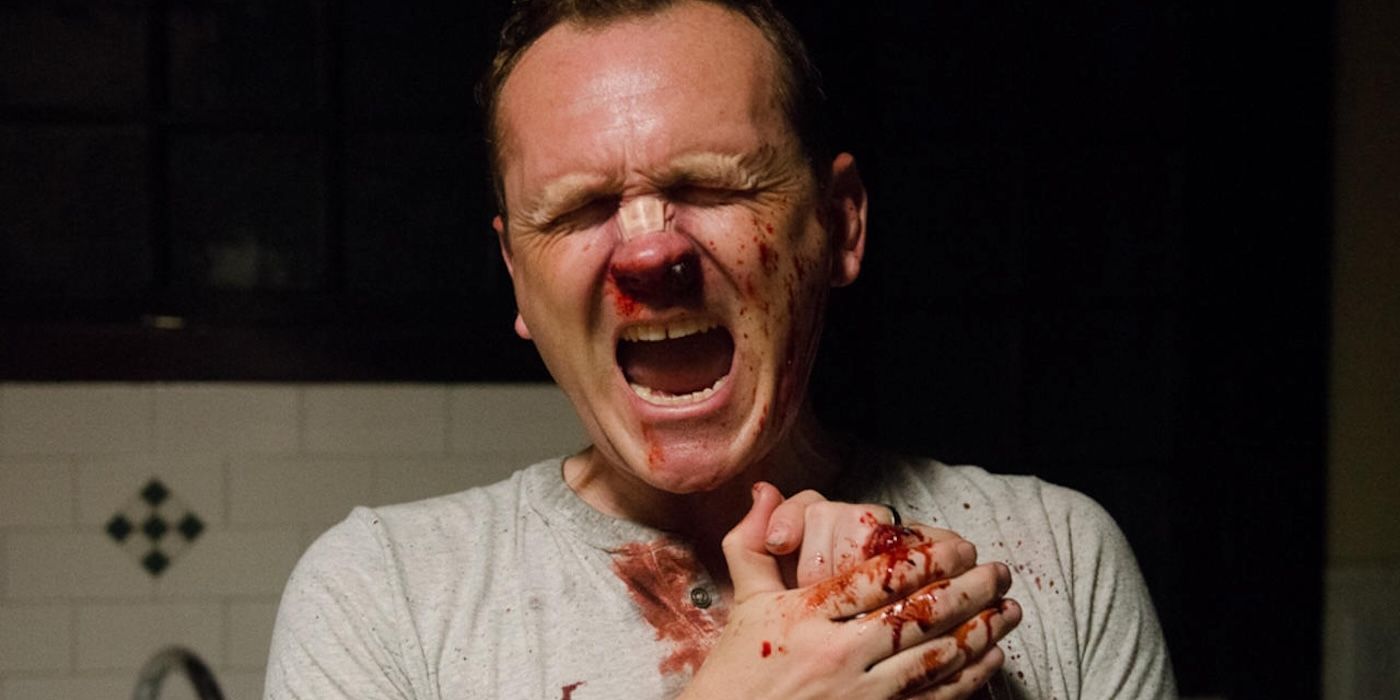The Big Picture
-
Cheap Thrills
presents a unique take on “Rich vs. Poor” narratives. - The characters in the film embody distinct archetypes reflecting working-class struggles.
- The film delves into capitalism’s impact on morality, showcasing desperation’s role in immorality.
From The Hunger Games to Squid Game, the elite sadistically toying with the working class is not a concept we haven’t seen numerous times before. Wave a couple of big bills at someone who is at their wits’ end keeping their family alive and safe, and let the heartless entertainment begin. The equally crass and sharp Cheap Thrills follows suit, as an everyday man sells his soul to an egregiously rich couple to keep his family afloat. But what sets this crude film apart from its peers is that both working men are pitted against each other voluntarily. And this voluntary participation endures for the entire run-time. As the events spiral out of control, each man is welcome to walk away, yet faithfully remain steadfast in this Faustian tale, jostled into action as every glimpse of green acts like another hit of the good stuff.

Cheap Thrills
A scheming couple put a struggling family man and his old friend through a series of increasingly twisted dares over the course of an evening at a local bar.
- Run Time
- 85 minutes
- Director
- E. L. Katz
- Release Date
- March 21, 2014
- Actors
- Pat Healy, Sara Paxton, Ethan Embry, David Koechner
‘Cheap Thrills’ Sets Itself Apart From “Rich vs. Poor” Films
Usually these tales begin with some form of monetary incentive, but as the downward spiral in morality occurs, most participants are forced to stay. Cheap Thrills, however, follows the average Joe, Craig (Pat Healy), and criminal Vince (Ethan Embry), who are old friends who choose to become marionette dolls for an outrageously wealthy couple, and at times, even ramp up the stakes and brutality for themselves. Craig is in one of the lower times of his life, finding an eviction notice tacked onto his apartment door and losing his job on the same day. Instead of returning home to his wife and 18-month-old son, he drinks his sorrows away in a bar, only to bump into his old mate Vince. The pair had known each other during Craig’s less-than-savory days, but it turns out Vince had been promoted to breaking peoples’ hands in front of their children while collecting debts for loan sharks. While Vince is not in as precarious of a situation as Craig, when Colin (David Koechner) and Violet (Sara Paxton) start flashing cash at them, he greedily follows along.
Like many Faustian films, where people desperate for money sell their souls to the elite, the dares gradually ramp up in intensity, from simply chugging down a shot to getting slapped by a female bar-goer. In the red-lit bar, Craig starts off as pretty hesitant, while Vince jumps in with manic glee, eager to score easy cash. The point Craig finally dives in is when he is dared to punch a security guard in a heart-racing scene that is propelled forward by insane adrenaline. From then on, the competition between the men is fierce, egged on by testosterone and momentum as both spiral uncontrollably down a black hole, letting go of any ethical concerns they may have previously had. Throughout the film, a sense of uneasiness is evoked as we realize that they truly can walk away any time they like, and they even consider doing so at multiple stages, but the berserk frenzy keeps catching up with them as they head towards the jaw-dropping finale at full throttle.
Each Character in ‘Cheap Thrills’ Embodies an Archetype
As the dynamics between the four characters are established, it is clear that each one embodies a certain archetype. Craig is a typical representation of the working class, a failed writer who works a dead-end job to try and make ends meet for his family, only to find refuge in a bar when his life starts tumbling down. With mouths to feed and being the lone breadwinner, Craig becomes the paragon of desperation in Cheap Thrills and once he surpasses his moral threshold, he fully commits to whatever money he can win to keep his family afloat. In comparison, Vince is also somewhat of a working-class man, though he favors illegal activities. His chosen field of criminal activity isn’t necessarily lucrative though, and while he is dazzled by the cases of green paper, it is really his hedonistic and violent streak that initially attracts him to th game. Ironically enough, it is this wild side that ends up becoming his crutch in the finale.
Colin and Violet also encapsulate two different kinds of sadistic members of the elite we see on the screen. Colin is probably more of the caricature we are used to, boisterous, loud and viscerally enamored by the havoc he is able to inflict on the two men. But this is layered with undercurrents of menacing psychopathy, suggesting he isn’t as coked up as he seems to be, getting off on the power he has. While Koechner becomes a scene-stealer with his booming voice and thundering presence, Paxton injects a sinister quietness into her character that is equally powerful. Lou is more of a sociopathic, wealthy person, content to observe and snap pictures while only occasionally indulging in maximizing the men’s mental distress. While the economic and moral divide between the players and the game-masters is pretty overt, it is the gap between Craig and Vince that propels the film’s more interesting social commentary.
‘Chap Thrills’ Is a Nasty and Pitiless Look at Capitalism
Both Craig and Vince struggle financially, but it is Vince who already displays the capacity to take the moral low ground. Yet this bloodthirsty, temperamental and “nothing to lose” demeanor ironically becomes his downfall. Already armed with experience of skirting the law and being a lone wolf, Vince is perfectly set up to compete in the initial stages of the game. But by manipulating the system instead of joining it, he hasn’t necessarily been crushed by it. Meanwhile, Craig did everything. He tried his hand at his dreams, and when he failed he scored a steady job with a steady income that would help him build his family. However, the economic system doesn’t necessarily reward this commitment, as Craig becomes yet another exploited working-class member whose hope and grit have been frayed away for years.
As such, his devolution during this game becomes his strength, exhibiting a capacity for violence and brutality that surpasses Vince, simply due to pure desperation. There’s a scene where he strides back into the mansion with knuckles tightened in resolve. It turns into Craig’s breaking point, where his bloodied face, tense lines, and roaring mouth all invoke connotations to an animal that is erupting from its cage. The increasing contrast between the friends, where Vince gradually loses confidence and Craig is seeped in horrific cruelty, suggests that it is this cage of capitalism that nurtures a stronger capacity for immorality in classes that are exploited, simply due to pressure and desperation. The game itself reflects the system in a dirty and potent way, as each man competes to be “better” in this closed system, constantly trying to one-up each other to get their hands on a promised future. It becomes a rat race in the most confronting and brutal sense.
Rich People Are Not the Only Monsters in ‘Cheap Thrills’
We have seen the idea of how far someone would go to save their family, but Cheap Thrills complicates this concept by exploring how ethical and economic divides interact with each other. Both the wealthy couple and Craig are painted to be capable of depravity here, exhibiting similar moral values yet being on opposite sides of the monetary spectrum. Colin and Violet’s immorality mainly takes its form in voyeurism, as they generally enjoy sitting back and watching the two players sabotage one another in this twisted game. They prefer simply guiding and manipulating their toys into deviancy without actually implicating themselves into these acts. As such, they demonstrate the knowledge of how to manipulate the system in their favor, once indicating how capitalism facilitates their ability to do so through their immense wealth and access to resources.
While Craig may not have started with the same moral compass, he certainly degrades his own by the end of the film. With differing motivations and finances, Craig’s coldness in the finale ends up likening him to the couple, finding a twisted and dark similarity between them. The film revels in devastation and debasement, offering a nasty and heartless look into the economic system that inadvertently becomes a breeding ground for sin. Satirically named Cheap Thrills, the film offers cheap morals for not-so-cheap prizes that encourage us to compete as well — what would you do for $50,000?
Cheap Thrills is available to stream now on Peacock in the U.S.
WATCH ON PEACOCK

